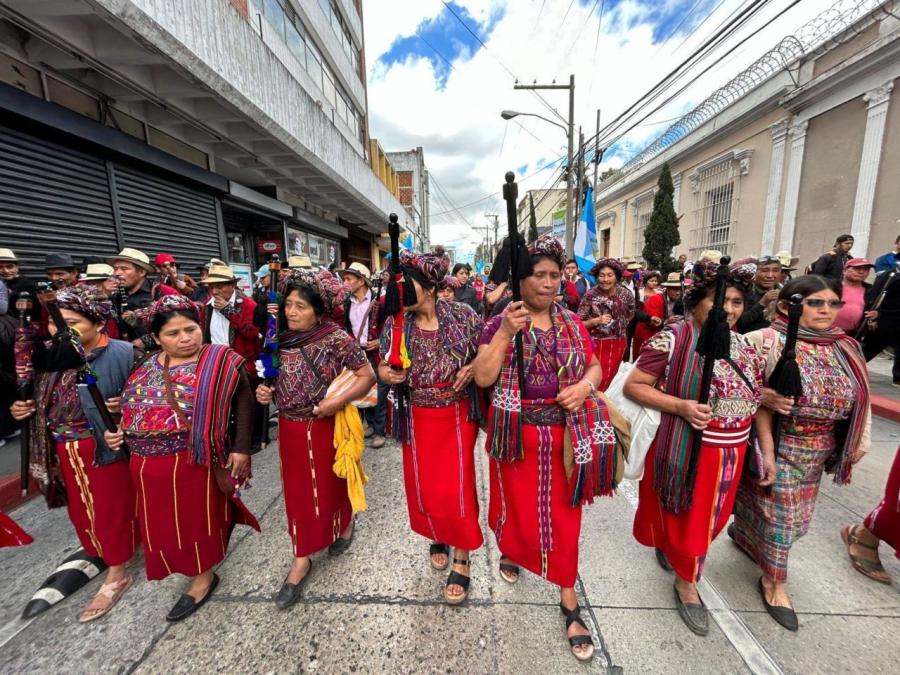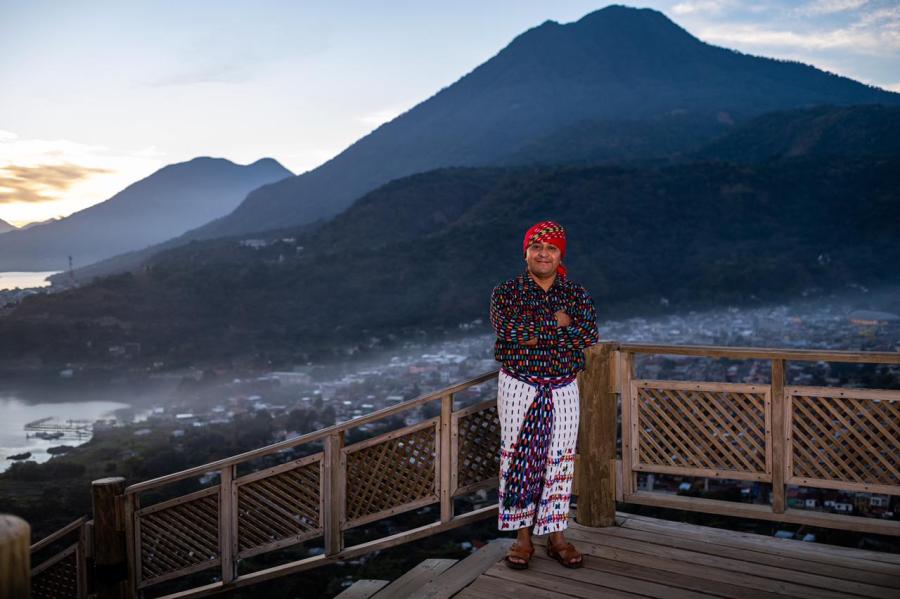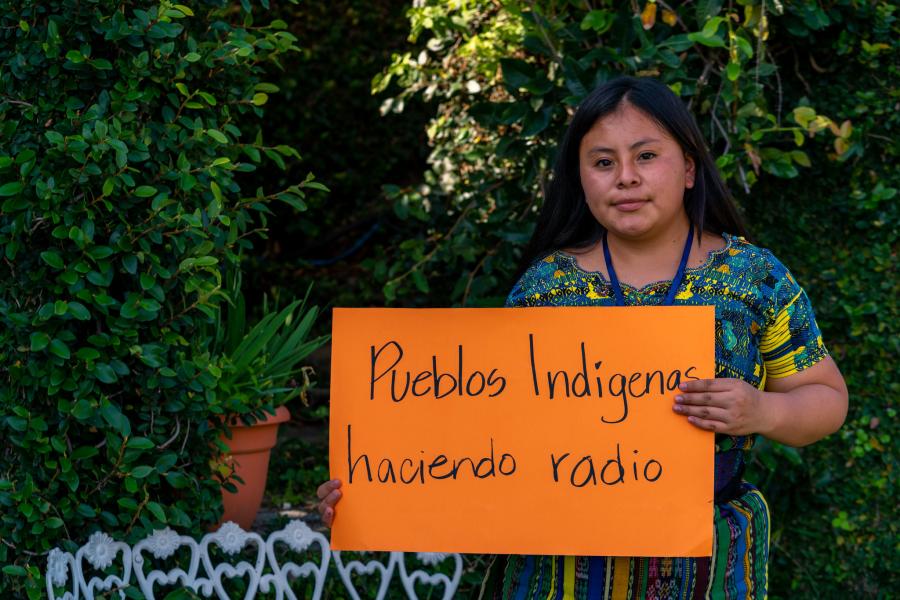
"It will go down in history, all the men and women who promoted radio, the radio will be used to defend our rights and defend our language, as Q'eqchi' people," said teacher Guadalupe Quinich, during Radio Xyaab 'Tzuultaq'a’s inauguration on March 5, 2017, in El Estor, Guatemala. The inauguration coincided with the beginning of the Mayan New Year, Joob Tz'ikin.
With candles, ocotes, and chocolates, the spiritual guides conducted a Mayan ceremony to thank God for giving life to the radio station. Pacaya leaves and pine decorated the community radio station. Little by little the local people stopped by to see the radio cabin and to congratulate the organizers in launching the radio.

With great joy, people from El Estor listened to the first broadcast. “What started as a dream became reality with the support of Cultural Survival, WACC and the accompaniment of Sobrevivencia Cultural,” said Robín Sicajan, director of Association for Integral Development (AEPDI). “We went through a process to truly understand what a community radio consists of. The support of Cultural Survival and Sobrevivencia Cultural was essential, as was ensuring the participation of women and spiritual guides in organizational processes.”
Sicajan pointed out, “We are going to amplify the voices of the community, we are not going to censor anything, radio will be a means for communities to make their complaints heard and to inform others about what is happening at the national and international level.” Sicajan also explained that the term Xyaab 'Tzuultaq' a means “the voice of the hills” in the Q'eqchi' language.

According to Anselmo Xunic from Sobrevivencia Cultural, “community radio is a right of the Indigenous Peoples.” During the signing of the Peace Accords in 1996, Guatemala committed to provide frequencies to Indigenous Peoples, yet that has not been fulfilled. “We do not want to be illegal, for that reason we have presented four bills to legalize community radio stations, and last year congress took the first two steps, by holding the first two readings of the proposed revision to the telecommunications law. However, the commercial radio owners, stopped the process,” said Xunic.
“Information is fundamental to demand our rights. In 2013, we denounced the State of Guatemala for violating the right to freedom of expression and the lack of democratization of media before the Inter-American Commission on Human Rights,” said Cesar Gomez, who is the legal representative of Sobrevivencia Cultural. “Laws are not made for us, Indigenous Peoples, and only benefit a small privileged group. We must inform ourselves about our rights through radio and demand these rights.”
Cornelia Cul, a Women’s Department office representative called on women, men, young people, young women to join in the communication process, to defend the station that is part of El Estor.
“We are happy to be part of Radio Xyaab 'Tzuultaq’a’s inauguration. It is the voice of the hill, of the planets, of the valleys, where voices from those who have not been heard will come. They will share their customs, traditions, their sadness and joy, and it will be a space where they can come and exercise their free thinking,” Community leader Domingo Caal pointed out. "We have to go back to our homes and tell our friends that we have a community radio station," he said.
After hearing the words of Indigenous authorities, representatives, institutions, organizations and youth, the symbolic cut of a tape was inaugurated, accompanied by the music of the marimba.

Since 2013, El Estor-based AEPDI had dreamed to have a radio station serve the community, to inform, educate, entertain, and strengthen their identity as a people. They began planning and negotiations in July 2013, when Angélica Rao and Anselmo Xunic from Cultural Survival and Sobrevivencia Cultural made their first visit and met with Adelso Romel Reyes Reyes, the director of the Defensoría Q'eqchi' at the time who expressed the interest of the municipality to have this means of communication.
Matilde Chocooj, leader of AEPDI, who was given the role of following up on the proposal, brought together about 35 people from various sectors of the community, including the Community Development Council and auxiliary municipalities to explain what community radio is and how it can benefit local people. At the meeting, Angélica Cubur and Anselmo Xunic shared the experience of Radio Ixchel, from Sumpango Sacatepequez.
The organization AEPDI, better known as the Defensoría Q'eqchi, has promoted the Indigenous Peoples’ rights and the demand for the right to Land and Territory through programs and radio spots on commercial media, paying high costs for limited time slots. Therefore, the participants were eager to open their own community-controlled radio stations that would reflect their needs and values.
Since then, several proposals for funding were submitted but international support was not obtained. Despite these adversities, they continued searching and last year an opportunity with Cultural Survival’s Community Media Grants Project opened up. Consultations were made with various organizations and institutions in El Estor to find out about the viability of a community radio. "The result was positive," said Avexnim Cojti from Cultural Survival. "With the financial support from the grant, the community was able to purchase transmission equipment. AEPDI bought the land where the station was established and the communities collaborated in constructing the building.”

El Estor is a municipality of Guatemala which is approximately 320 kilometers from Guatemala City. Eighty percent of the population speak Q'eqchi. With the station’s opening, Indigenous leaders present at the inauguration expressed their hope to strengthen their struggle and their identity and work hard utilizing educational and informational radio programs about their rights and civic participation.



